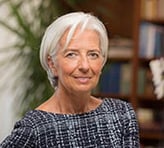The managing director of the International Monetary Fund commands attention when she speaks about the global economy. The financial world took notice April 2 when Christine Lagarde titled a speech to the U.S. Chamber of Commerce A Delicate Moment for the Global Economy and said growth projections for this year were “precarious” due to Brexit, trade tensions and other downside risks.
However, Lagarde also used the occasion to underline another source of risk “where the IMF has stepped up its focus on the macroeconomic effects on our member nations”: corruption.
She noted that the annual cost of bribery alone exceeds $1.5 trillion, or 2% of global GDP. “Money laundering and the financing of terrorism are other serious dimensions of the problem - where the IMF has been working with over a hundred countries.”
Impact on Growth
“Our latest research underlines the high fiscal cost of corruption, leading to a massive loss in public revenue and lower-quality public spending,” Lagarde added. “This new analysis confirms what we had all long suspected: Corruption lowers growth. It increases inequality. It feeds distrust.”
Conversely, citing the fund's April 2019 Fiscal Monitor, Lagarde said, “We estimate that within a group of similar economies, less corruption is associated with higher tax revenues - in fact, a very significant difference of up to 4 percentage points of GDP between countries. Better governance is also associated with higher student test scores and more efficient spending on vital infrastructure: from roads, to schools, to hospitals.
“This highlights the potentially huge benefit of curbing corruption - and not only fiscal benefit, but also the potential benefit to society at large.”
International Dimension
She held out hope that “the right policy responses can make a significant difference.”

A recent update to the Transparency International Corruption Perceptions Index showed that two-thirds of all countries score below 50 (100 = very clean), “indicating that they have serious problems in preventing corruption,” Lagarde said. “Certainly, countries must accept responsibility for what happens within their own borders. But corruption is an international plague. To fight it effectively requires internationalcooperation.”
That led to a broader point about the IMF and international policy cooperation: “During the global financial crisis,” Lagarde said, “the fund was able to commit over $500 billion to help prevent another Great Depression. In the decade since, we supported economic programs in over 90 countries . . . Consider the fund's advice to countries to help them open up their markets and encourage investment,” and “recent support for critical country programs in Egypt, Tunisia, and Jordan. Think about Ukraine. Or Argentina.”
She said she was confident that support from the 189 IMF member countries “remains strong” as the IMF-World Bank spring meetings approached, the week of April 8.
Preventing Monopoly
Also on Lagarde's mind: “increasing concentration of market power by a few corporate giants” and a “winner-takes-most dynamic,” especially in the digital economy, where a small number of companies account for the highest price mark-ups.
“I am not saying that we currently have a 'monopoly problem,'” the IMF chief said. “But I am saying that we should take appropriate measures - so that it does not become a problem.
“That means reducing barriers to entry for new firms and reforming competition frameworks to ensure a level playing field in all sectors, whether traditional or high-tech.”
McWilliams on Examinations
Another official speaking at the U.S. Chamber's annual Capital Markets Summit, Federal Deposit Insurance Corp. chairman Jelena McWilliams, said that the agency's new Tech Lab is working on ways to apply technology to bank examinations and become less dependent on on-site work.
“We can't examine the way we did 20 years ago,” McWilliams said. “We can't have examiners on the road 90 days out of the year as they are now.”
In a March 21 speech, McWilliams mentioned efforts to reduce the regulatory burden, including her own priority to simplify community banks' capital requirements, and addressed the “tone of examinations” metaphorically:
“Our examination approach should not be such that we focus more on seeking out dirt than on whether the home is clean. But if we walk in and find that the home is dirty, we will take action. And you can rest assured that if you try to just sweep the dirt under the rug, we will find it.”
Main Street Poll
The U.S. Chamber released a Financing Main Street report, in which two-thirds of more than 300 company treasurers and other surveyed executives said that increased bank capital charges negatively affected their ability to obtain financing. Nearly three out of 10 said their businesses have had to increase prices because of regulations.
“Unfortunately, the post-2008 financial crisis regulatory response imposed enormous costs on the economy while doing little to fundamentally reform the U.S. financial regulatory system,” said the report's executive summary. “As a result, Main Street businesses found it more difficult to access the capital they needed to innovate, grow, and hire new employees.”
A large-company financial executive quoted in the survey said that if small businesses “can't get access to liquidity or credit, the economy is going to falter. It is a slippery slope if Congress doesn't step in and find ways to make it easier for business owners, especially small-business owners, to access capital and liquidity.”